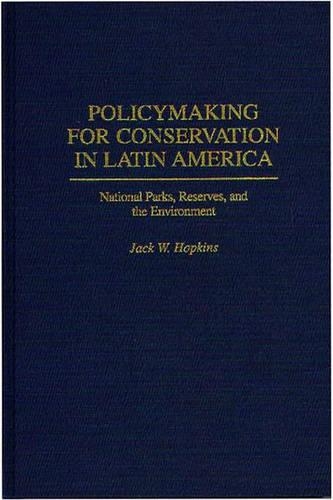
Policymaking for Conservation in Latin America: National Parks, Reserves, and the Environment
(Hardback)
Publishing Details
Policymaking for Conservation in Latin America: National Parks, Reserves, and the Environment
By (Author) Jack W. Hopkins
Bloomsbury Publishing PLC
Praeger Publishers Inc
20th October 1995
United States
Classifications
Tertiary Education
Non Fiction
Central / national / federal government policies
333.72098
Physical Properties
Hardback
232
Width 156mm, Height 235mm
510g
Description
The book, a study of policymaking for conservation in Latin America, employs comparative analysis to explain the policy process in three countriesArgentina, Chile, and Costa Rica. Case studies and examples of important policy decisions made in the three countries are employed to help illuminate variations in the policy process from country to country. The analysis is set against the constant conflict between demands for economic development and conservation. Hopkins has selected important examples of policy problems in the areas of conservation, national parks, and environmental protection in the three countries and set these against the political system in each country for comparison. The cases range from the controversial issue of Lago Chungara in Chile to Corcovado National Park in Costa Rica to the Yacyreta hydroelectric project in Argentina. The study aims at beginning to fill an important gap in the literature on national parks, conservation, and environmental protection in Latin America. As such, the volume will be of interest to students of contemporary Latin America, policymaking, and environmental studies.
Reviews
[a]valuable contribution to the information available about environmental conflicts and policy issues and processes in Latin America.-Journal of Iberian and Latin American Studies
Despite tremendous pressures for economic growth, infrastructure expansion, industrial development, and resource exploitation, several Latin American countries have created impressive systems of mational parks and protected areas. Hopkins focises on policy issues and policy process related to countries in that region that arguably have been most successful at developing protected area systems: Argentina, Chile, and Costa Rica. Through a comparative public policy approach that relies on detailed case studies, he identifies the most important issues involved in protected area policy development, and the particular variables that explain the degree of success each country has achieved in creating protected areas...Suitable for upper-division undergraduates through preofesionals.-Choice
"avaluable contribution to the information available about environmental conflicts and policy issues and processes in Latin America."-Journal of Iberian and Latin American Studies
"[a]valuable contribution to the information available about environmental conflicts and policy issues and processes in Latin America."-Journal of Iberian and Latin American Studies
"Despite tremendous pressures for economic growth, infrastructure expansion, industrial development, and resource exploitation, several Latin American countries have created impressive systems of mational parks and protected areas. Hopkins focises on policy issues and policy process related to countries in that region that arguably have been most successful at developing protected area systems: Argentina, Chile, and Costa Rica. Through a comparative public policy approach that relies on detailed case studies, he identifies the most important issues involved in protected area policy development, and the particular variables that explain the degree of success each country has achieved in creating protected areas...Suitable for upper-division undergraduates through preofesionals."-Choice
Author Bio
JACK W. HOPKINS serves as the director of the Indiana Center on Global Change and World Peace. A Professor in the School of Public and Environmental Affairs at Indiana University, he is a long-time student of Latin America and the author or editor of seven books on the region.
